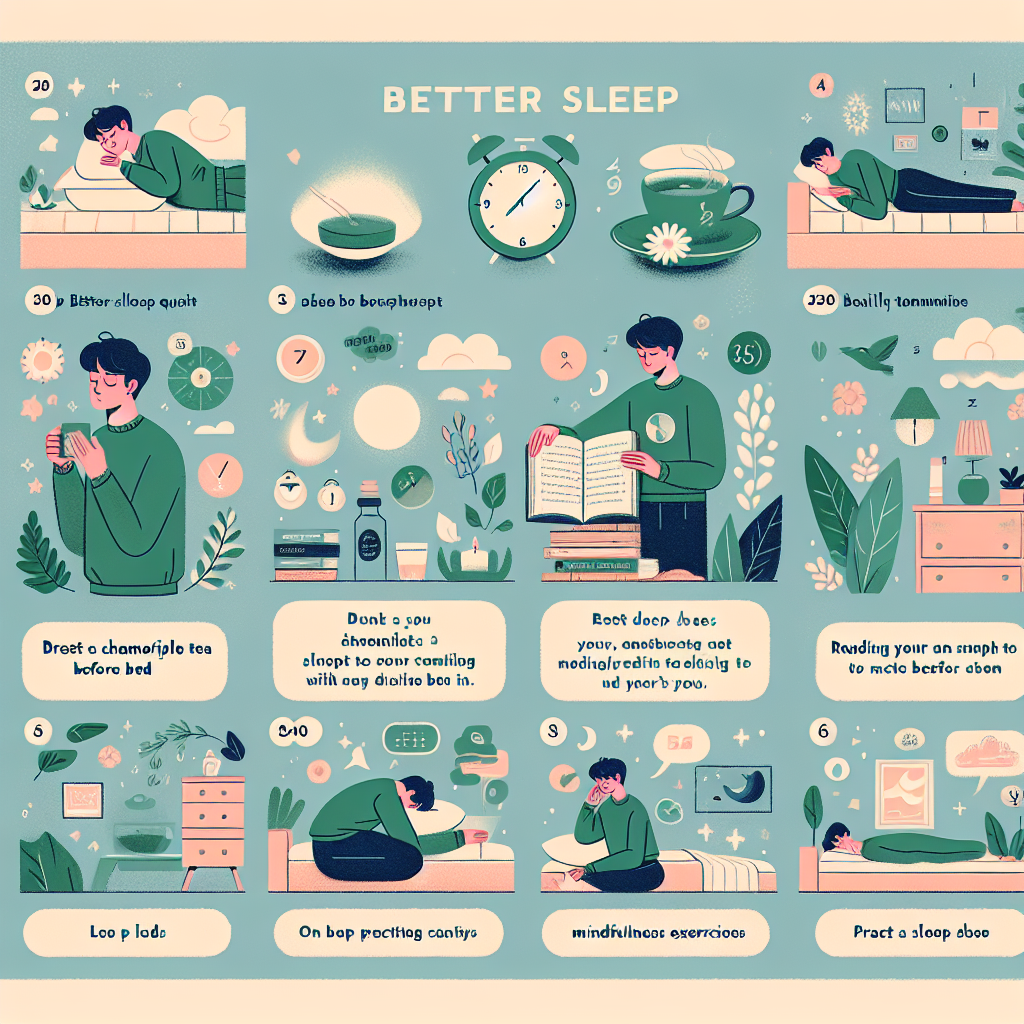Daily Habits for Better Sleep Quality

Start improving your sleep quality today by incorporating daily habits that promote better rest. Learn more about these habits and how to implement them into your routine by visiting My Vibrant Vitality. Don’t wait, start your journey towards better sleep now!
Incorporating Mindfulness into Your Nightly Routine for Improved Sleep Quality
Sleep quality is a critical aspect of overall health and well-being. It is not just about the quantity of sleep, but also the quality that matters. One of the most effective ways to improve sleep quality is by incorporating mindfulness into your nightly routine. Mindfulness, a form of meditation, involves focusing on the present moment and accepting it without judgment. It can help reduce stress, anxiety, and other factors that can interfere with healthy sleep.
Mindfulness can be practiced in various ways, and it’s all about finding what works best for you. One of the simplest methods is mindful breathing. This involves focusing on your breath, observing each inhale and exhale without trying to change it. As you do this, you may find that your mind begins to wander. This is normal. When it happens, gently bring your attention back to your breath. This practice can help calm your mind and prepare it for sleep.
Another mindfulness technique that can be beneficial for sleep is a body scan meditation. This involves mentally scanning your body from head to toe, paying attention to any sensations, tension, or discomfort. As you notice these sensations, try to release the tension or simply observe it without judgment. This can help you become more aware of your physical body and any stress it may be holding, which can interfere with sleep.
Mindfulness can also be incorporated into your nightly routine through mindful activities. This could be anything from reading a book to drinking a cup of herbal tea. The key is to do these activities with full attention and without distraction. For example, if you’re drinking a cup of tea, focus on the taste, the warmth of the cup in your hands, and the sensation of the tea going down your throat. This can help you stay present and grounded, which can promote better sleep.
In addition to these practices, it’s also important to create a mindful sleep environment. This means creating a space that is conducive to relaxation and sleep. This could involve keeping your room dark, quiet, and at a comfortable temperature. It could also involve investing in a comfortable mattress and pillows, and keeping your room clean and clutter-free. A mindful sleep environment can help signal to your body that it’s time to wind down and sleep.
Lastly, it’s important to maintain a consistent sleep schedule. This means going to bed and waking up at the same time every day, even on weekends. This can help regulate your body’s internal clock and can make it easier to fall asleep and wake up. It’s also beneficial to have a wind-down period before bed, where you engage in relaxing activities and avoid screens, which can interfere with sleep.
Incorporating mindfulness into your nightly routine can have a significant impact on your sleep quality. It can help you relax, reduce stress, and create a more conducive environment for sleep. However, like any habit, it takes time to develop. Start small, be consistent, and over time, you’ll likely notice improvements in your sleep quality. Remember, good sleep is not just about quantity, but also about quality. By incorporating mindfulness into your nightly routine, you can improve both.
The Impact of Diet and Exercise on Sleep Quality: Daily Habits to Adopt

Sleep quality is a crucial aspect of overall health and well-being. It is a well-known fact that a good night’s sleep can significantly improve mood, productivity, and cognitive function. However, achieving quality sleep is not always as simple as it sounds. Many factors can influence sleep quality, including stress, environment, and health conditions. Among these, diet and exercise are two key elements that can be controlled and adjusted to improve sleep. This article will delve into the impact of diet and exercise on sleep quality and suggest daily habits to adopt for better sleep.
Firstly, let’s consider the role of diet in sleep quality. The food we consume can have a profound impact on our sleep patterns. Certain foods and drinks, such as caffeine and alcohol, can interfere with the sleep cycle and lead to poor sleep quality. On the other hand, foods rich in tryptophan, magnesium, and melatonin, such as turkey, almonds, and cherries, can promote better sleep. Therefore, it is essential to be mindful of what we consume, especially in the hours leading up to bedtime.
One daily habit to adopt is to maintain a balanced diet that includes a variety of fruits, vegetables, lean proteins, and whole grains. These foods provide the necessary nutrients for the body to function optimally, including during sleep. Additionally, it is advisable to limit the intake of caffeine and alcohol, especially in the evening. Instead, opt for herbal teas or warm milk, which can have a calming effect and prepare the body for sleep.
Next, let’s turn our attention to the impact of exercise on sleep quality. Regular physical activity can significantly improve sleep quality by helping to regulate the body’s internal clock, or circadian rhythm. Exercise can also reduce stress and anxiety, which are common culprits of sleep problems. However, the timing of exercise can also affect sleep. Exercising too close to bedtime can stimulate the body and make it difficult to fall asleep.
A daily habit to adopt for better sleep is to incorporate regular physical activity into your routine. This doesn’t necessarily mean hitting the gym for an intense workout every day. Even light activities, such as walking or stretching, can be beneficial. Aim for at least 30 minutes of moderate exercise most days of the week. However, try to finish exercising at least a few hours before bedtime to give your body time to wind down.
In conclusion, diet and exercise play significant roles in sleep quality. By being mindful of what we eat and drink, and by incorporating regular physical activity into our daily routine, we can significantly improve our sleep quality. Remember, good sleep is not just about quantity but also about quality. By adopting these daily habits, you can set the stage for a better night’s sleep and, consequently, better overall health and well-being.
Exploring the Connection between Digital Detox and Enhanced Sleep Quality
In the modern era, the advent of technology has brought about a significant shift in our daily routines. The constant exposure to digital screens, be it for work or leisure, has become an integral part of our lives. However, this digital immersion often comes at the cost of our sleep quality. The connection between digital detox and enhanced sleep quality is a topic that warrants exploration, as it can provide valuable insights into improving our overall health and well-being.
Digital devices emit a type of light known as blue light. While this light is not harmful in itself, excessive exposure, especially during the evening hours, can disrupt our body’s natural sleep-wake cycle, also known as the circadian rhythm. This disruption can lead to difficulties in falling asleep, frequent awakenings during the night, and overall poor sleep quality.
The concept of digital detox involves consciously reducing the time spent on digital devices, particularly before bedtime. This practice can help mitigate the adverse effects of blue light exposure and promote better sleep quality. A digital detox doesn’t necessarily mean completely eliminating the use of digital devices. Instead, it encourages mindful usage, focusing on limiting screen time during the hours leading up to sleep.
One effective way to implement a digital detox is by establishing a nightly routine that excludes the use of digital devices. This could involve reading a book, practicing mindfulness or meditation, or engaging in any relaxing activity that doesn’t involve screen time. Such a routine can signal to your body that it’s time to wind down and prepare for sleep, thereby promoting a smoother transition into sleep.
Moreover, it’s beneficial to create a sleep-friendly environment. This includes keeping your bedroom dark, quiet, and cool, which can further enhance the quality of your sleep. It’s also recommended to reserve your bed for sleep only, as this can strengthen the association between your bed and sleep, making it easier to fall asleep and stay asleep throughout the night.
In addition to these practices, maintaining a regular sleep schedule can significantly improve sleep quality. Going to bed and waking up at the same time every day, even on weekends, can help regulate your body’s internal clock and make it easier to fall asleep and wake up in the morning.
While the idea of a digital detox may seem daunting, especially in a world where we are so reliant on technology, it’s important to remember that small steps can lead to significant changes. Even reducing screen time by just a few minutes each day can make a noticeable difference in your sleep quality.
In conclusion, the connection between digital detox and enhanced sleep quality is undeniable. By consciously reducing our screen time, particularly before bedtime, we can mitigate the adverse effects of blue light exposure and promote better sleep quality. Coupled with other healthy sleep habits, such as maintaining a regular sleep schedule and creating a sleep-friendly environment, a digital detox can significantly improve our overall health and well-being. So, why not give it a try? After all, a good night’s sleep is one of the best gifts we can give ourselves.